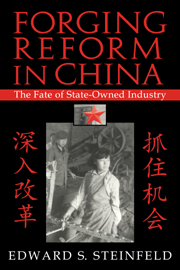Book contents
- Frontmatter
- Contents
- List of Tables and Figures
- Preface
- 1 Introduction: China's Ailing State Enterprises
- Part I Conceptual Approaches to Postsocialist Enterprise Reform
- Part II Enterprise Case Studies: The Commanding Heights in Transition
- Part III Reassessing Chinese Patterns of Economic Development
- 7 Extending the Argument: Budget Constraints and Patterns of Growth in China
- 8 Conclusion
- Notes
- Bibliography
- Index
8 - Conclusion
Published online by Cambridge University Press: 12 January 2010
- Frontmatter
- Contents
- List of Tables and Figures
- Preface
- 1 Introduction: China's Ailing State Enterprises
- Part I Conceptual Approaches to Postsocialist Enterprise Reform
- Part II Enterprise Case Studies: The Commanding Heights in Transition
- Part III Reassessing Chinese Patterns of Economic Development
- 7 Extending the Argument: Budget Constraints and Patterns of Growth in China
- 8 Conclusion
- Notes
- Bibliography
- Index
Summary
THE preceding chapters have been motivated by two rather different objectives. In one sense, they have sought – particularly through the case studies – to further our understanding of a major policy issue facing contemporary China: the reform of the state industrial sector. By illustrating the depth and complexity of the problem, the analysis has attempted to present a somewhat different face of China – neither the rising economic giant nor potential economic competitor often portrayed in the West, but rather a troubled transitional nation confronting absolutely awesome obstacles in its path to development. In a second sense, these chapters have sought to provide an alternative conceptual framework for understanding postsocialist reform in general, an approach that challenges popular notions of privatization and property-rights restructuring. Yet, what really are the implications of the theoretical and descriptive threads of the study? How do they change our broader understanding of East Asian development, and our specific image of China?
THE CONSTRAINTS-BASED APPROACH
This study has made some general assumptions about economic behavior; it has assumed that, given the certain degree of freedom and autonomy that exists in any system, entrepreneurs will always rise up to capture opportunities to amass wealth and benefits. The interesting question, however, involves determining how the combination of constraints and incentives in any given system influences the form that this entrepreneurial behavior takes. Do economic producers, particularly the most entrepreneurial ones, seek personal gain through value-enhancing or, alternatively, value-subtracting means?
- Type
- Chapter
- Information
- Forging Reform in ChinaThe Fate of State-Owned Industry, pp. 249 - 260Publisher: Cambridge University PressPrint publication year: 1998



